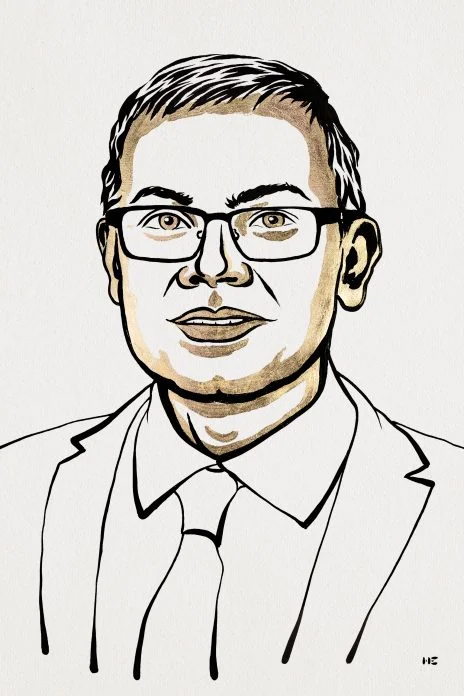Illustration of Sir Demis Hassabis by Niklas Elmehed © Nobel Prize Outreach
Submitted by Rachel Gardner on Wed, 09/10/2024 - 15:44
"The reason I've worked on AI my whole life is that I'm passionate about science and finding out knowledge, and I've always thought if we could build AI in the right way, it could be the ultimate tool to help scientists, help us explore the universe around us. I hope AlphaFold is a first example of that."
 These are the words of our alumnus Sir Demis Hassabis today after he received the news that the Royal Swedish Academy of Sciences was awarding the Nobel Prize in Chemistry 2024 jointly to him and his Google DeepMind colleague Dr John Jumper. The Prize is "for protein structure prediction".
These are the words of our alumnus Sir Demis Hassabis today after he received the news that the Royal Swedish Academy of Sciences was awarding the Nobel Prize in Chemistry 2024 jointly to him and his Google DeepMind colleague Dr John Jumper. The Prize is "for protein structure prediction".
The award recognises the major advances made possible by their AI model AlphaFold2, with whose help they have been able to predict the structure of virtually all the 200 million proteins that researchers have identified.
The duo share the award with biochemist Prof David Baker, Director of the Institute for Protein Design at the University of Washington, who receives it "for computational protein design".
"It is wonderful to see Demis's work recognised at the highest level — his contributions have been really transformative across many domains. I'm looking forward to seeing what he does next!" says our Head of Department, Professor Alastair Beresford.
Cambridge University Vice-Chancellor Prof Deborah Prentice has also offered her congratulations to Demis Hassabis and John Jumper. "Together, their pioneering work in the development and application of machine learning is helping transform our understanding of the world around us," she says.
Demis becomes the first of our alumni to receive a Nobel Prize. He studied Computer Science here as an undergraduate from 1994-7 before completing a PhD in cognitive neuroscience at University College London.
It's wonderful to see Demis's work recognised at the highest level — his contributions have been really transformative across many domains.
Prof Alastair Beresford, Head of Department
He co-founded DeepMind in 2010, a company that developed masterful AI models for popular board games. The company was sold to Google in 2014 and two years later, DeepMind came to global attention when the company achieved what many then believed to be the holy grail of AI: beating the champion player of one of the world’s oldest boardgames, Go.
In 2014, Demis was elected as a Fellow Benefactor and, later, as an Honorary Fellow of Queens' College. In 2024, he was knighted by the King for services to artificial intelligence.
In 2018, the University announced the establishment of a DeepMind Chair of Machine Learning, thanks to a benefaction from Demis's company, and appointed Professor Neil Lawrence to the position the following year.
“I have many happy memories from my time as an undergraduate at Cambridge, so it’s now a real honour for DeepMind to be able to contribute back to the Department of Computer Science and Technology and support others through their studies,” Demis said when the Chair was established.
As it happens, Demis's Google DeepMind colleague John Jumper is also a Cambridge University alumnus. He completed an MPhil in theoretical condensed matter physics at The Cavendish Laboratory here in 2011 before obtaining his PhD in Chemistry from the University of Chicago.
Life could not exist without proteins. That we can now predict protein structures and design our own proteins confers the greatest benefit to humankind.
The Royal Swedish Academy of Sciences
"The Nobel Prize in Chemistry 2024 is about proteins, life's ingenious chemical tools," says the Royal Swedish Academy of Sciences in its press release announcing the 2024 Nobel Prize for Chemistry. "David Baker has succeeded with the almost impossible feat of building entirely new kinds of proteins. Demis Hassabis and John Jumper have developed an AI model to solve a 50-year-old problem: predicting proteins' complex structures. These discoveries hold enormous potential.
"In proteins," the Academy adds, "amino acids are linked together in long strings that fold up to make a three-dimensional structure, which is decisive for the protein's function. Since the 1970s, researchers had tried to predict protein structures from amino acid sequences, but this was notoriously difficult. However, four years ago, there was a stunning breakthrough [with AlphaFold2]. Since then, AlphaFold2 has been used by more than two million people from 190 countries. Among a myriad of scientific applications, researchers can now better understand antibiotic resistance and create images of enzymes that can decompose plastic."
They add: "Life could not exist without proteins. That we can now predict protein structures and design our own proteins confers the greatest benefit to humankind."

